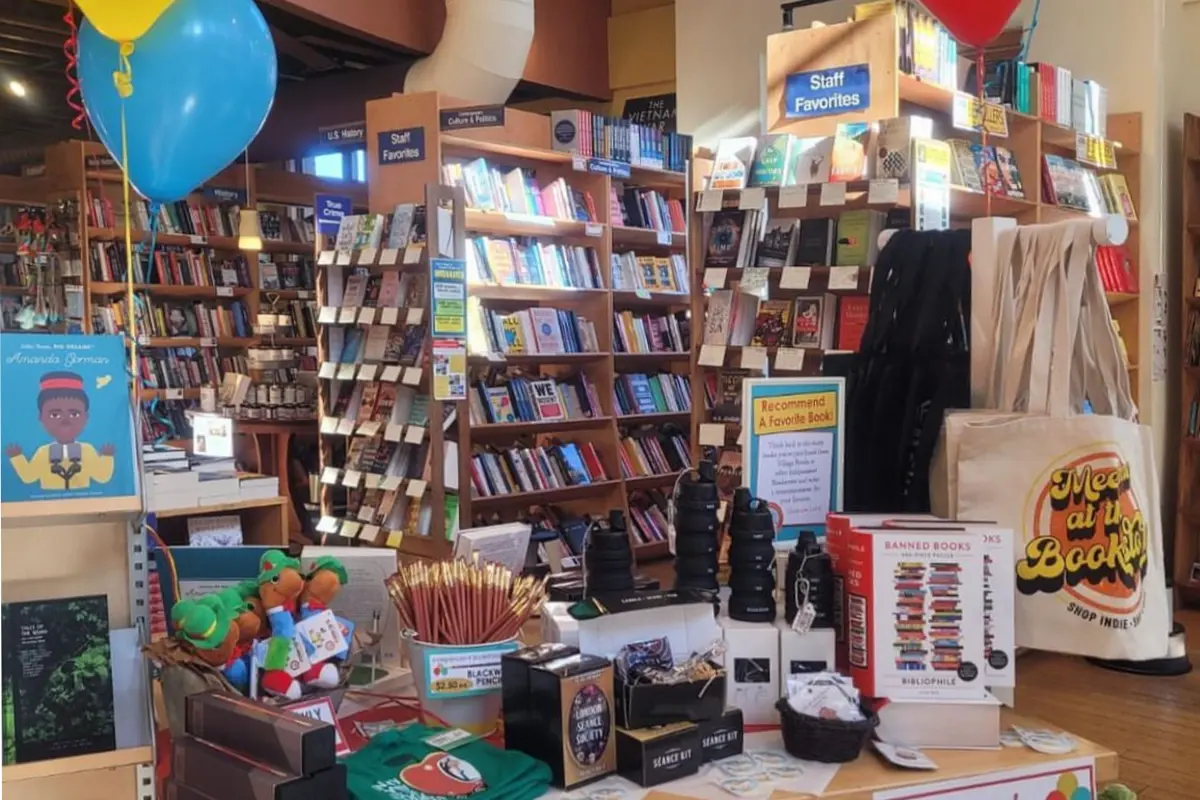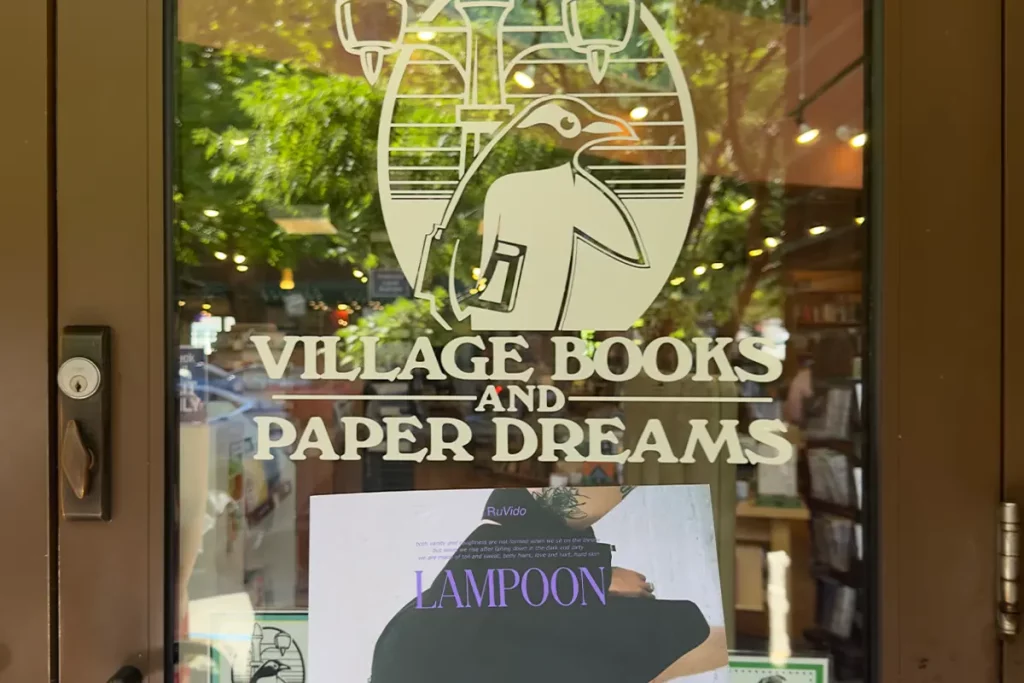«We try to source as much as we can locally»: Village Books and Paper Dreams co-founders talk about local fiscalism and community building in North America
Village Books and Paper Dreams: a community-based bookstore in Fairhaven and Lynden, Washington
Village Books and Paper Dreams bookstore was founded by Chuck and Dee Robinson in 1980. From Fairhaven, Bellingham (Washington) the store expanded to a new three-story home in 2004. Later, a second location blossomed in Lynden’s historic Waples Mercantile Building. In 2017, the trio of Kelly Evert, Paul Hanson, and Sarah Hutton took the reins.
«Lots of bookstores claim to be community-based, but it’s truly our mission statement. Every decision we make, from the products we sell to the events we host, revolves around this goal» Paul Hanson explains.
Strengthening human interaction featuring events at Village Books
Before Covid, the bookstore hosted more than three-hundred events annually, featuring regional, national, and international individuals of the literary world. Throughout the decades, Village Books and Paper Dreams has welcomed authors like Anne Lamott, Louise Penny, Markus Zusak, Jan Brett, and Rick Steves. Events are made possible through community partnerships with local organizations, including the Whatcom Literacy Council, the North Cascades Institute, and the Whatcom Humane Society.
«People come to us not only to buy things but also because this place is where they live and connect with family, friends, and people they know. It’s a space for social interaction and discoveries. They seek out personal recommendations that algorithms can’t provide».
Bookstores can rewrite communities – the mission of Village Books and Paper Dreams
«The first thing that popped into my head was the ability to work within schools. It’s nice to have that one-on-one interaction with the kids and teachers, being able to help them and organize events for children to support both bookstores and the community. One thing we prioritize is having booksellers connect with the people coming into the store, as we are a smaller community in a college town», Kelly Evert shares. According to her, «talking to people one-on-one has been instrumental in our growth».
Catering to a distinct customer base: the two locations in Washington
«We have a location in Fairhaven, which serves as our flagship store. Fairhaven is a historic community within the town of Bellingham, along with Lynden, Washington. We wanted to extend our reach to more people in the northern part of our county, since it’s close to Canada’s border. Having two stores allows us to participate in and share the history of both communities with others».
Operating in two distinct locations with diverse communities, the independent bookstores boast different customer bases and cater to varied interests: «They’re very different areas with distinct populations. The northern part of our county is primarily farmland, with many farms and migrant workers. We are working to provide books and resources for those families. On the other hand, the one in Bellingham is more college student-oriented. Because of these differences, we have to buy and merchandise differently, catering to their interests».
Village Books about independent bookstores and fiscal localism
Independent bookstores have faced challenges over the years, especially with the rise of online retailers, e-books, and chain bookstores. The competitive pricing offered by online platforms have attracted many customers away from physical bookstores. However, a lot of them still appreciate the personalized service, curated selections, and the sense of community that independent bookstores offer: «’Independent’ means that we all do things differently, which allows us to take on the flavor and character of the community we’re in. Thus, we are reflective of the community, making each bookstore a little snapshot of the community it serves».
Talking about fiscal localism, Paul Hanson shares that «We try to source as much as we can locally». Fiscal localism is often seen as a means to enhance economic resilience, foster community development, and address the needs of various regions within a country or jurisdiction. By allowing communities to have more control over their financial matters, proponents of fiscal localism believe it can lead to more efficient and responsive governance, improved public services, and greater accountability to residents.
«If somebody buys something through a local bookstore, a large percentage goes directly back into the community through wages, taxes, and other means. If they buy through a chain, then it’s roughly half of that stays in the community, and the other half goes somewhere else. If they buy online from someone else, none of it stays locally».
Minorities within the literary industry, publishing is changing: Indigenous authors in focus at Village Books
Addressing the question about how the perception of minorities and their significance within the literary
industry has evolved in recent years, Paul remarks that transformations have transpired during this
period. «Within the publishing industry a change was necessary, starting with publishers who needed to produce and print more books that were representative of diverse perspectives. In the past our choices were limited, but now there is a vast and diverse selection available».
Interest in indigenous authors has grown, reflecting a societal shift towards recognizing and celebrating diverse voices and experiences in literature. Several factors have contributed to this increased interest: «We are in the land of the First Nations, Lummi and Nooksack tribes: that’s why we have many indigenous authors in our area. Arianne True is, for example, a Washington State Poet Laureate who is of the Choctaw and Chickasaw nations in Tacoma, WA. One of our bestsellers, Red Paint, is written by Sasha LaPointe, of the Nooksack Indian Tribe».
The bookstore also has their own publishing imprint, the Chuckanut Reader, an eighty-pages magazine produced quarterly. It focuses on local history, interests, and authors. «Each year, we publish a list of our bestsellers, with the top ten often comprising community-reads and locally published books, showcasing our commitment to promoting local literature».
Can literature transcend individualism? Online practices to form communities
Stories that evoke emotions or remind us of our childhood strengthens the connection between the reader and the content: «The ability to connect with others on a profound level is proper of literature». Evert shares that «when I was growing up in the seventies and eighties, reading books was quite common; but, nowadays, with the advent of book clubs and the widespread use of social media, people have more opportunities to share and discuss their favorite stories».
Digital platforms today enable the formation of online book clubs and reading communities, where individuals can come together to discuss. While the digital age has its challenges and drawbacks, these virtual gatherings allow readers to exchange thoughts and perspectives, leading to a sense of belonging and unity around publishing.
«Fandoms have been a huge thing in the younger generation, with people creating literature based on primary source texts. They have online fan bases and create a world where they and others can immerse themselves», Laura Miller adds. «Also, StoryGraph is an app that most of my coworkers use. It differs from Goodreads because it is not owned by Amazon, which sets it apart from larger corporations» she points. «It allows you to track books, write reviews, and log your reading progress, generating graphs that show your reading habits, such as reading speed and preferred genres. It offers many insightful features you might not consider».
Village Books and Paper Dreams
Village Books is a community-based, independent bookstore in Bellingham’s Historic Fairhaven District. It was awarded Tourism Business of the Year and named Washington State’s Outstanding Philanthropic Business. It has author events, a radio show, home decor, locally made art and stationery, new, used and bargain books and sells eBooks through its website. Second location is in Lynden.




















